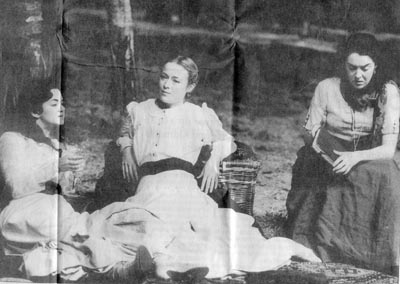

Revolution in the air - Victoria Hamilton, Jennifer Ehle, and Derbhle Crotty in Summerfolk
There is even more distinguished acting in Maxim Gorky's Summerfolk, at the Olivier Theatre - and more of it. Names such as Simon Russell Beale, who plays an overburdened doctor, and Michael Bryant, who plays a blunt old millionaire, speak for themselves.
Then there are Roger Allam, on top form as a pleasure-loving lawyer, Jennifer Ehle as his idealistic wife and Henry Goodman as a suave author; and if that isn't enough, Victoria Hamilton gives a brilliant performance as a young wife who channels her discontent into coquettishness, and Patricia Hodge (who has been discovering new depths lately) is calmy impressive as an older woman who falls in love with a younger man.
Less familiar names shine, too; Beverley Klein as Russel Beale's sad-mean-funny little hausfrau, for instance, and Olvier Cotton as a coarse building-contractor. But it isn't only a question of individual camoes. The cast are drawn from Trevor Nunn's National Theatre Ensemble, and their performances knit together - theirs is true ensemble acting - in a way that justifies the name (Nunn himself directs, in collaboration with Fiona Buffini.).
As for the play itself, which was written in 1904, it is a long, episodic affair about a group of visitors who rent dachas in the country for the summer - business and professional types, most of them risen from the ranks of the poor. They can roughly be divided into the materialists, intent on having a good time, and the idealists, who feel they owe it to Russia, and to their own origins, to take part in the fight against backwardness and inequality.
There are two Gorkys apparent in the play, too. One is the disciple of Chekhov - rougher, but also more robust. The other is the revolutionary, spitting hatred at the bourgeoisie. The first provides nuanced studies of his characters and lets even the least congenial of them have his day in court. The second is all for action and agitation and marching off into the future.
It is the first Gorky who predominates much of the time, and although the result may not be Chekhov, it doesn't fall all that far short. But what are we to do about the second Gorky? Can we altogether put out of our minds what was coming - the terrors of a revolutionary regime, which almost certainly murdered Gorky himself, though not before he had written some shameful pages on behalf of its worst activities?
The playwrigh who speaks up so staunchly for women in Summerfolk, for instance, was the same man who was to publish an article extolling the "women shock-workers" helping to construct Stalin's Moscow-Volga Canal - in reality, women slave-labourers who were dying like flies.
The more strident passages in the play make it hard to forget such things; so does the production (or Nick Deare's adaptation), which very much underlines the revolutionary message at the end. Luckily this is only one element in a complex work. Most of the evening doesn't obtrude; we are free to relish Gorky's human insights and imaginative breadth without misgiving. But there's just a touch of something unpleasant about the aftertaste.
Back to Summerfolk Article Index